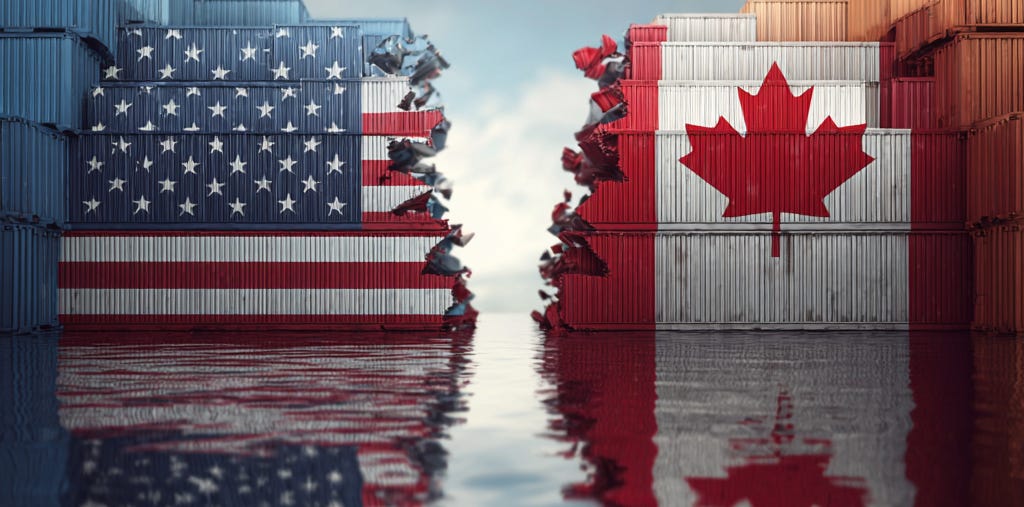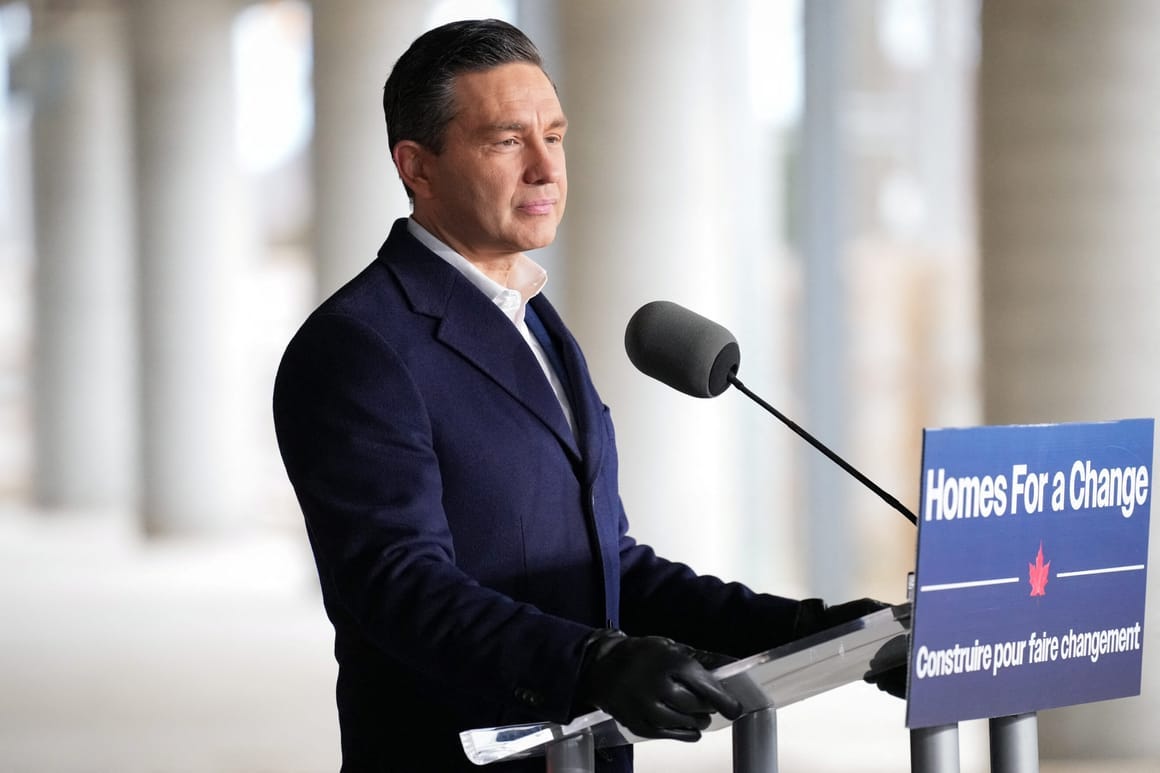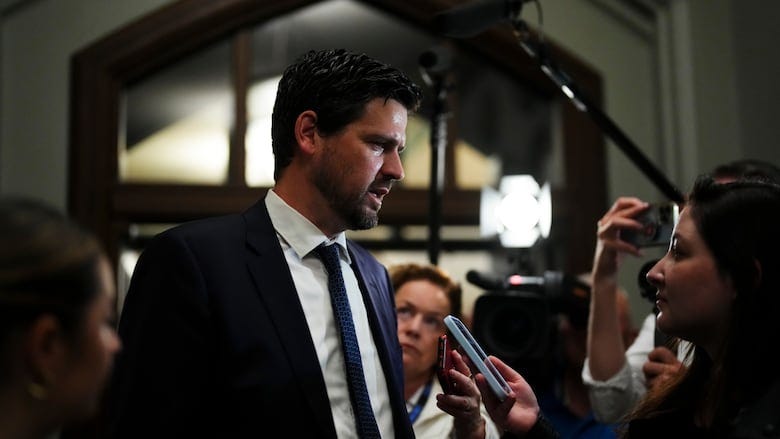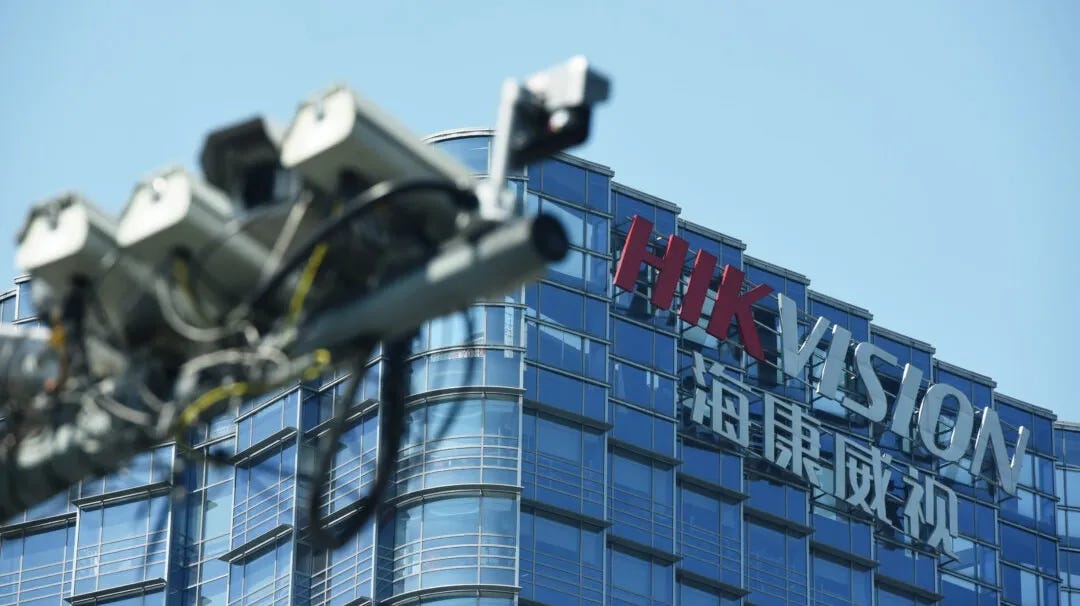Good morning, it’s Monday, June 30th. In today’s news, Canada cancels the Digital Services Tax after Trump walks from trade talks, Alberta byelection set to return Poilievre to Parliament, the Liberal’s Online Harms Bill is getting an overhaul, UN nuclear watchdog says Iran could return to enriching uranium in months, and much more.
First time reading the Daily Blend? Sign up here.
Canada Pulls Digital Services Tax After Trump Walks from Trade Talks
Canada has withdrawn its planned Digital Services Tax (DST) just hours before it was set to take effect, following the abrupt collapse of trade negotiations with the United States.
The tax, first introduced in 2020, would have imposed a 3% levy on digital services revenue earned from Canadian users by large multinational tech firms. It was set to apply retroactively from January 2022 and would have affected companies such as Amazon, Google, Meta, and Apple. The DST was scheduled to come into effect on July 1, 2025.
On Friday, U.S. President Donald Trump announced that he was walking away from ongoing trade negotiations with Canada, calling the digital tax a “blatant attack” on American companies. He also pledged to introduce new tariffs on Canadian goods within the week. The move effectively froze months of discussions between the two countries, which had been aiming for a renewed economic agreement by July 21.
The Canadian government responded on Sunday night by announcing it would not proceed with the tax. In a statement, the Finance Ministry said legislation would be introduced to formally rescind the Digital Services Tax Act. The government cited the importance of maintaining stable trade relations with the United States and stated that it preferred a multilateral approach to digital taxation, referencing ongoing discussions at the OECD.
The DST had been a point of contention between the two countries for some time. In 2024, the Biden administration had requested formal trade consultations over the measure, arguing that it violated Canada’s commitments under the North American trade agreement. Canada had maintained that the tax was a temporary measure meant to ensure large digital firms contribute revenue where users are located.
Canada is the second-largest trading partner of the United States, with over $760 billion in two-way trade in 2024. The threat of new tariffs raised concerns across industries that rely on cross-border supply chains, including automotive, energy, agriculture, and technology.
With the tax now formally pulled, Canadian and U.S. officials are expected to resume trade discussions in the coming days. Both governments have indicated they intend to reach a deal before the July 21 deadline set during last month’s G7 summit.
The situation remains fluid as negotiations continue. Source.
Alberta Vote Set to Return Poilievre to Parliament—With Carney’s Help
In a rare show of political civility—or strategic calculation—Prime Minister Mark Carney is expected to call a byelection in Alberta’s Battle River–Crowfoot riding as early as Monday, setting the date for mid-August. The move effectively paves the way for Conservative Leader Pierre Poilievre to return to the House of Commons following his April defeat in the Carleton riding.
According to sources familiar with Carney’s thinking, the byelection will be held either August 11 or 18, a timeline designed to avoid clashing with Alberta Heritage Day and to ensure the vote concludes well before Parliament reconvenes in mid-September. “No games,” said Carney in a post-election press conference—his promise to move quickly on the byelection appears to be holding.
The vacancy comes after Battle River–Crowfoot MP Damien Kurek voluntarily stepped down to allow Poilievre to contest the seat. Kurek was re-elected in April with more than 82% of the vote, making the riding one of the most secure Conservative strongholds in the country. For Poilievre, it’s a low-risk re-entry into Parliament. For Carney, it’s an opportunity to project fairness while quietly neutralizing potential criticisms of delay or partisanship.
But it may also reflect deeper political calculus. With the Conservatives polling well nationally and Carney still solidifying his footing as the newly elected Liberal leader and Prime Minister, allowing Poilievre an easy path back could signal confidence—or an effort to limit distractions while Carney implements his agenda. A prolonged absence of the opposition leader from Parliament could have turned into a political sideshow, something Carney’s team likely wanted to avoid.
The Liberal Party has yet to confirm whether it will run a candidate in the byelection, though spokesperson Matteo Rossi said “many talented community leaders” are being approached and that the nomination process is ongoing. Given the riding’s deep blue history, any Liberal campaign would likely be symbolic.
In the grand scheme, this byelection won't shift the balance of power, but it does serve as a test of tone between two sharply opposed political figures. Whether this decision fosters more cross-party cooperation or simply resets the stage for renewed partisan clashes remains to be seen. Source.
Ottawa’s Online Harms Bill Set for Overhaul Amid AI and Deepfake Concerns
After two failed attempts, the federal government is preparing to revisit its controversial online harms legislation this summer, with renewed focus on artificial intelligence, child exploitation, and deepfake technology. Justice Minister Sean Fraser says the Liberals are taking a “fresh look” at the bill, though it’s still unclear whether the legislation will be rewritten or reintroduced in its previous form.
The original Online Harms Act was first proposed in 2021 under then-heritage minister Steven Guilbeault, but faced heavy criticism over free speech concerns. It was reintroduced in 2024 by Arif Virani, Fraser’s predecessor, and sought to balance child protection with civil liberties. That version required platforms to remove content involving child sexual abuse or non-consensual intimate images—including AI-generated deepfakes—within 24 hours, and imposed a duty of care on platforms to protect children. However, it also included Criminal Code and Human Rights Act amendments related to hate speech, which civil liberties advocates warned could chill online expression.
Before the 2024 election, Virani had pledged to split the bill into two parts to separate the criminal and civil liberty concerns, but the legislation died when Parliament dissolved.
Fraser, now leading the file, says no decision has been made on whether the bill will be split, merged into a broader crime bill, or tabled as a standalone reform package. What is clear is that AI has shifted the online landscape significantly, and the government is under pressure to address emerging threats like sexual deepfakes and online child exploitation.
The new iteration of the bill is expected to involve significant collaboration between the ministries of justice, Canadian identity and culture (now led again by Guilbeault), and the newly formed artificial intelligence ministry, headed by MP Evan Solomon.
Meanwhile, Conservative MP Michelle Rempel Garner is pushing forward with her own private member’s bill targeting online harms. Framed as a non-partisan alternative, her proposal mirrors aspects of the previous Liberal bill—including a duty of care for platforms and specific language targeting deepfake abuse—but aims to avoid sweeping limitations on civil liberties.
As Fraser prepares for consultations over the summer, the future of the bill remains uncertain. But with AI advancing rapidly and public concern over online exploitation growing, the pressure is mounting for Ottawa to act—this time without overstepping constitutional bounds. Source.
UN Nuclear Watchdog Chief Says Iran Could Return to Enriching Uranium in Months
According to Rafael Grossi, the head of the International Atomic Energy Agency (IAEA), Iran could resume uranium enrichment within months. Although recent US airstrikes damaged Iran’s key nuclear sites—Fordow, Natanz, and Isfahan—the facilities are not completely destroyed, and some enrichment capacity remains. In response, President Trump has threatened additional strikes if Iran restarts enrichment at levels deemed threatening. While Iran claims its nuclear program is for civilian energy, enrichment above 60% purity brings it closer to weapons-grade levels. The US and IAEA plan to reassess the damage and resume negotiations with Iran to ensure its program remains peaceful and to seek long-term stability in the Middle East. More
Federal Government Orders Chinese Company Hikvision to Cease Canadian Operations
The Canadian government has ordered Chinese surveillance tech giant Hikvision to shut down all operations in Canada, citing national security risks after a multi-step intelligence review. All federal agencies are banned from purchasing Hikvision products, and existing equipment is under review. The company has ties to the Chinese military and is accused of aiding human rights abuses in Xinjiang. In response, China has condemned the move and threatened retaliation, framing it as a disruption of trade. Canada’s decision aligns with similar bans in the US and UK, reflecting growing Western concern over Chinese tech infiltration. More
Carney Set to Call Mid-August Alberta Byelection, Clearing Poilievre's Path to a New Seat - More
Moscow-Led Eurasian Bloc Holds Landmark Economic Summit in Minsk - Launched in 2015, the EAEU is comprised of Armenia, Belarus, Kazakhstan, Kyrgyzstan, and Russia. More
Serbia’s President Vows More Arrests After Huge Antigovernment Protests Demand Early Election - Out of 77 people arrested, 38 remain in custody, most of whom are now facing criminal charges. More
US Supreme Court Sided with Parents Seeking to Keep Their Kids From LGBTQ Books and Education in the Classroom - More
Son of Norwegian Crown Princess Accused of Multiple Rapes and Two Dozen Other Counts - More
Warren Buffett Announces $6 Billion in Donations to Five Foundations
Warren Buffett is donating a record $6 billion worth of Berkshire Hathaway Class B shares to five foundations, bringing his total contributions since 2006 to about $60 billion. The recipients include the Bill & Melinda Gates Foundation Trust, the Susan Thompson Buffett Foundation, the Sherwood Foundation, the Howard G. Buffett Foundation, and the NoVo Foundation. Buffett’s Class B shares recently closed at $485.68 each and have outperformed the broader US market over the past year. He has pledged that 99.5% of his estate will go to philanthropy, although he plans to end donations to the Gates Foundation after his death. More
Statistics Canada: Canada’s GDP Shrank 0.1% in April, with a Similar Decline Expected in May - More
AI Employee Wars: Meta Reportedly Poaches Four More Researchers From OpenAI - More
DOGE: Termination of ‘Wasteful Contracts’ Saves US Government $470 Million Last Week - More
MIT Develops Device That Pulls Drinking Water From Thin Air—Even in Death Valley
MIT researchers have developed a high-tech “bubble wrap” made of hydrogel that can harvest safe drinking water directly from air—even in extremely dry places like Death Valley. The device absorbs water vapour at night and condenses it on a cool glass surface during the day, producing up to two-thirds of a cup of water daily without needing electricity. A special design minimizes harmful lithium salt leakage, making the water safe to drink. Multiple panels could supply enough water for households in areas lacking safe drinking water, offering a low-cost, space-efficient solution to global water scarcity. More
Scientists Have Discovered Bacteria Capable of Breaking Down Toxic “Forever Chemicals” (PFAS) Found in Contaminated Soil -These PFAS-eating microbes—isolated from industrial pollution sites in northern Italy—use the chemicals as their sole source of carbon and energy, offering a promising natural solution to one of the world's most persistent environmental threats. More
The Next Bond? Amazon’s Wishlist Includes Jacob Elordi, Tom Holland, and Harris Dickinson
Denis Villeneuve has been tapped to direct the next James Bond film—Bond 26—with Amazon targeting a 2028 release due to the massive scale of the production. Villeneuve beat out several high-profile directors, including Edward Berger and Edgar Wright, while Alfonso Cuarón and Christopher Nolan were both early contenders but are now committed elsewhere. Amazon and producers are seeking a British actor under 30 for the role, with Jacob Elordi, Tom Holland, and Harris Dickinson in contention. Longtime franchise stewards Barbara Broccoli and Michael Wilson have stepped back, leaving creative control to Amazon for the first time. More
Fight Recaps:
UFC 317: Ilia Topuria KOs Charles Oliveira with Brutal Knockout to Become the Tenth Fighter to Capture Two Division Belts - More
Boxing: Jake Paul Beats Julio Cesar Chavez Jr. By Unanimous Decision, Improving His Record to 12-1 - More
LeBron James Picks Up His $52.6 Million Option with the Lakers - More
Pistons' Malik Beasley Being Investigated for Allegations of Gambling - More
Utility Workers Digging Trenches Stumble Upon 1,000-Year-Old Mummy With Intact Hair
‘The Plane is on Autopilot’: Flight Attendant Confesses That Crew Members Have Sex in the Cockpit
On this day in 1938, Superman made his debut in Action Comics #1, marking the birth of the superhero genre and the beginning of DC Comics' legendary legacy. A copy of Action Comics #1 in near-mint condition is one of the most valuable comic books in the world. In 2014, a CGC-graded 9.0 copy sold for $3.2 million USD on eBay.


















